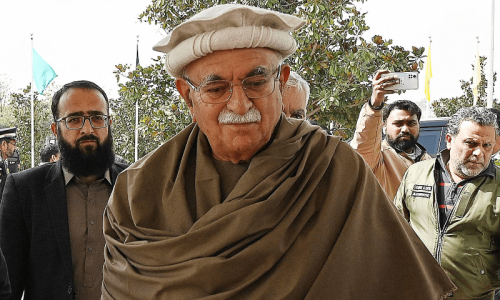KARACHI, April 29: While a number of non-Muslims living in Karachi and four other districts of Sindh remain unable to benefit from the Bait-ul-Maal as they consider it is meant for Muslims only due to its Arabic name, their awareness of the Benazir Income Support Programme and the subsequent benefits the low-income groups of Hindus and Christians get are far better, showed a research report launched on Monday.
The study titled ‘Access of minorities to BISP and Bait-ul-Maal’, conducted by NOW Communities with the help of the Asia Foundation, was based on a random sampling survey of clusters of Hindus and Christians living in different areas of Karachi, Sanghar, Umerkot, Tharparkar and Mirpurkhas. More than 100 clusters were identified for the purpose and 1,200 questionnaires were filled during the survey.
Officials associated with the two schemes said they did not ask about his or her religion when a deserving person approached them. They said their data did not show the religion of the beneficiaries. While Bait-ul-Maal, according to its documents, caters to all people whose monthly family income is less than Rs4,000, the BISP mainly benefits women whose family income is less than Rs5,000 a month, the report says.
Overall 48.4 per cent of the Hindus surveyed during the study said they were getting benefits of the BISP. The district-wise survey showed 58.6pc Hindus getting benefits of the BISP in Mirpurkhas, 56.8pc in Umerkot, 39.2pc in Karachi, 28.8pc in Tharparkar, while only 17.4pc Hindus surveyed in Sanghar said they were beneficiaries of the BISP. However, the percentage of those asked about Waseela-i-Rozgar, Waseela-i-Haq and Waseela-i-Taleem was on the lower side, the report said.
Similarly, overall 47pc of the Christians surveyed during the study said they were getting benefits of the BISP. The district-wise survey showed 62pc Christians getting benefits of the BISP in Mirpurkhas, 51pc in Umerkot, 50pc in Tharparkar and 60pc in Sanghar. However, only 37pc Christians in Karachi said they were getting BISP benefits, the report said.
During the survey, respondents described low literacy rate, behaviour of Nadra and Baitul Maal staff and Internet-based complaint system of the BISP as main hurdles in receiving the cash grants. The report suggested that the inclusion of people from the religious minorities in the Bait-ul-Maal and BISP could improve the service.
Speaking at the launch of the report, rights activists and representatives of non-Muslims said a very important change that the BISP had brought was documentation of poverty besides empowering women particularly in rural areas. “You cannot imagine the positive impact the BISP schemes had on the women of rural areas,” said Farhat Parveen of NOW Communities while explaining that for them even Rs1,000 a month was of great help. However, the report suggested to the government that the grant be increased to Rs3,000 considering the high inflation rate.
Besides, the report stated, it was a general perception that the schemes were used for political gains, the continuity of the social protection programme was doubtful if parties other than the one that introduced it were voted to power.
Safina Javed said that people were found benefiting from Waseela Haq, they were comparatively less aware of Waseela Sehat and other schemes of the BISP. However, she said, the survey helped raising awareness among the religious minorities about the scheme.
About the need for conducting the study, Umer Abbas of NOW Communities said that there was a general perception that the BISP and Bait-ul-Maal lacked transparency and both were used for political gains.
On the occasion, Michael Javed demanded that political parties abolish their minority wings and allow the religious minorities space in their mother wings so that they could participate in decision-making process.
Representing the MQM minority wing, Mangla Sharma said the BISP was one of the few things the previous government did for the benefit of the poor and weak sections of society.
Rahila Tiwana said civil society should set up help desks in different districts to raise awareness among the minorities of the benefits and procedures available to them through the social safety schemes.














































Dear visitor, the comments section is undergoing an overhaul and will return soon.